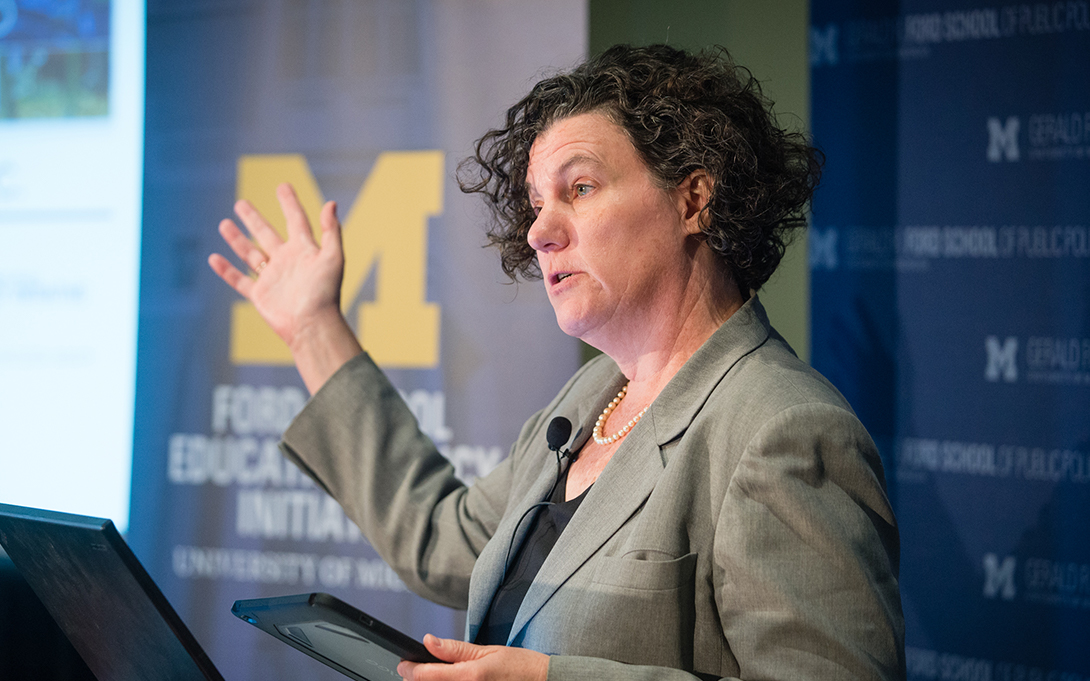
Since 2008, Sue Dynarski has been one of the Ford School's most active faculty working to reform public education, fighting for educational equity and inclusiveness, and training the next generation of education policy experts. She has taught hundreds of Fordies the intricacies of program evaluation, statistics, econometrics, regression analysis, and causal inference. And she has used those same tools to remove barriers to educational opportunities through policy change.
She now is making a transition to be closer to family and friends and return to the community where she was born and raised and where she began her first career as a union organizer. She will join the Harvard Graduate School of Education in fall 2021.
For anyone wishing to send Sue a tribute or reminiscent, they can do so using this form.
Recapping her influence at the Ford School, Dean Michael S. Barr says, “Sue fights for educational equity and advocates for inclusivity at every opportunity. She is transforming access to higher education."
Perhaps her two most significant contributions were her work on the creation of the HAIL program and on financial aid reform.
In 2015, Sue and her colleagues set out to address disparities in applications to selective universities like U-M. Their research led them to help design and evaluate the wildly successful HAIL Scholars program. HAIL students were more than twice as likely to apply to, gain admission, and enroll at U-M than students who did not receive the HAIL scholarship offer.
U-M President Mark Schlissel commented, “Cost should never be a barrier to in-state students seeking to study at the University of Michigan. This research has given us important data that has helped us design programs that provide greater access to the life-changing educational opportunities at a top public research university."
On financial aid, Sue found that just four questions on the FAFSA could explain 90 percent of the variation in eligibility. Her research and advocacy led to a new form. Starting in 2023, the FAFSA will include just 33 questions from the original 108, and applicants will also be able to directly transfer tax information from the IRS.
Sue has also dedicated herself to supporting causal inference research and rigorous graduate-level training. Sue co-founded the Education Policy Initiative (EPI) research center in 2012 with Brian Jacob. Since then, EPI has raised nearly $30 million for research, training programs, public engagement, partnerships, and importantly the Michigan Education Data Center (MEDC).
She also led U-M's interdisciplinary Causal Inference in Education Policy Research (CIEPR) predoctoral and postdoctoral training programs, which prepares doctoral students to design, implement, and analyze research to evaluate the causal impacts of education programs and policies in partnership with educational agencies.
Sue's had been recognized with awards far and wide:
- Top 100 U.S. education policy influencers (2021): Sue was ranked among the top 100 education policy influencers by Education Week. She received high points in the Google Scholar and Education Press Mention categories.
- Andrew Carnegie Award (2020): Sue was chosen from hundreds of nominees to receive $200,000 in philanthropic support for high-caliber scholarly research in the humanities and social sciences that addresses important and enduring issues confronting our society.
- Global Education Evidence Advisory Panel, UK Foreign, Commonwealth & Development Office (2020): One of 12 panel members which issues a report on “the best investments to improve the quality and take-up of education in developing countries, as the world faces a learning crisis, with the coronavirus pandemic forcing more than 1.6 billion children out of their classrooms.”
- University Diversity and Social Transformation Professor (2019): Named in recognition of her excellence in scholarly inquiry related to DEI, inclusive teaching and mentoring, as well as impactful service and engagement that has provided greater access and opportunity.
- APPAM Spencer Foundation Award for Excellence in Education Research (2017): Recognized for her noteworthy contributions through research and analysis in the field of education policy and management.
- College Board, Rethinking Student Aid/Reimagining Pell Task Forces (2013): The Study Group provided recommendations that focused on designing a system that would use available funding as effectively as possible.
- Vernon Prize, best article in Journal of Policy Analysis and Management (2013): In recognition for the article "Experimental Evidence on the Effect of Childhood Investments on Postsecondary Degree Attainment and Degree Completion"
- National Association of State Financial Aid Administrators, Golden Quill Award (2009): For contributions to the literature on student financial aid.
An overview of her many accomplishments can be seen on a tribute page.
